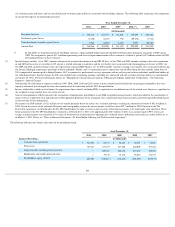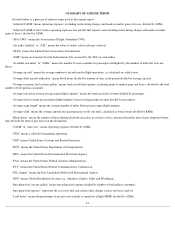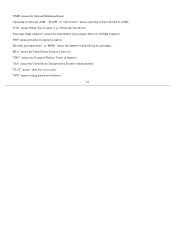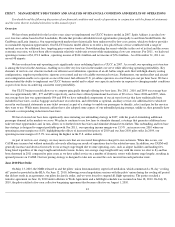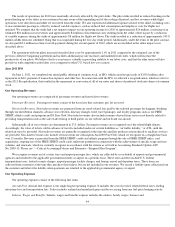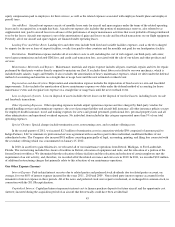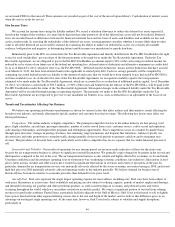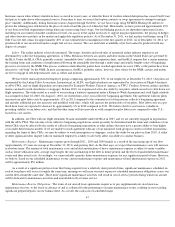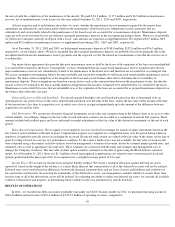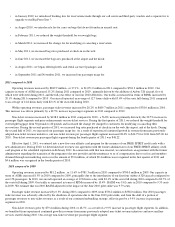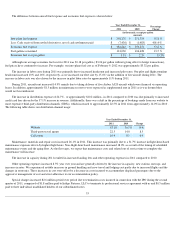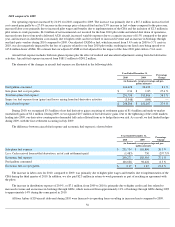Spirit Airlines 2011 Annual Report Download - page 55
Download and view the complete annual report
Please find page 55 of the 2011 Spirit Airlines annual report below. You can navigate through the pages in the report by either clicking on the pages listed below, or by using the keyword search tool below to find specific information within the annual report.
maintenance events are paid well in advance of the recognition of the maintenance event in our results of operations. Please see “—Critical
Accounting Policies and Estimates—Aircraft Maintenance, Materials, Repair Costs and Related Heavy Maintenance Amortization” and “—
Maintenance Reserves.”
Critical Accounting Policies and Estimates
The following discussion and analysis of our financial condition and results of operations is based on our consolidated financial
statements, which have been prepared in accordance with accounting principles generally accepted in the United States. The preparation of these
financial statements requires us to make estimates and judgments that affect the reported amount of assets and liabilities, revenues and expenses,
and related disclosure of contingent assets and liabilities at the date of our financial statements. Note 1 to our financial statements provides a
detailed discussion of our significant accounting policies.
Critical accounting policies are defined as those policies that reflect significant judgments or estimates about matters that are both
inherently uncertain and material to our financial condition or results of operations.
Revenue Recognition. Revenues from tickets sold are initially deferred as ATL. Passenger revenues are recognized when transportation is
provided. An unused non-refundable ticket expires at the date of scheduled travel and is recognized as revenue for the expired ticket value at the
date of scheduled travel.
Our most significant non-ticket revenues include revenues generated from air travel-related fees paid for baggage, bookings through our
call center or third-party vendors, advance seat selection, itinerary changes and loyalty programs, and are recognized at the time products are
purchased or ancillary services are provided. These revenues also include commissions from the sales of hotel rooms, trip insurance and rental
cars recognized at the time the service is rendered.
Customers may elect to change their itinerary prior to the date of departure. A change fee is assessed and recognized on the date the change
is initiated and is deducted from the face value of the original purchase price of the ticket, and the original ticket becomes invalid. The amount
remaining after deducting the change fee is called a credit shell which expires 60 days from the date the credit shell is created and can be used
towards the purchase of a new ticket and the Company’s other service offerings. The amount of credits expected to expire is recognized as
revenue upon issuance of the credit and is estimated based on historical experience. Estimating the amount of credits that will go unused
involves some level of subjectivity and judgment.
Non-ticket revenues include revenues from our subscription-based $9 Fare Club, recognized on a straight-line basis over 12 months.
Revenues generated from the sale of FREE SPIRIT miles and credit card renewals are currently recognized on a straight-line basis over 16
months based on expected customer usage of miles. We make assumptions on the future use of customer miles based on historical customer
behavior. To the extent that customer behavior changes as a result of, among other factors, economic conditions, perception of travel, and the
number of miles to earn awards, a corresponding adjustment would be made to the period in which we recognize revenue generated from the
FREE SPIRIT miles and credit card renewals, resulting in either a smaller or larger liability. Also included in non-ticket revenues are milestone
payments in connection with the achievement of specific usage and user volumes, which we recognize when received from the FREE SPIRIT
credit card provider.
Frequent Flier Program. We accrue for mileage credits earned through travel, including mileage credits for members with an insufficient
number of mileage credits to earn an award, under our FREE SPIRIT program based on the estimated incremental cost of providing free travel
for credits that are expected to be redeemed. Incremental costs include fuel, insurance, security, ticketing and facility charges reduced by an
estimate of fees required to be paid by the passenger when redeeming the award.
We also sell mileage credits to companies participating in the FREE SPIRIT program (or affinity card program). Under our original
affinity card program, funds received from the sale of mileage credits are accounted for as a multiple-element arrangement and allocated to a
marketing component and a transportation component (mileage credits) using the residual method. The fair value of the transportation
component is deferred and recognized ratably as passenger revenue over the estimated period the transportation is expected to be provided. The
difference between the funds received and the fair value of the transportation component is recognized in non-ticket revenue at the time of sale
as non-
ticket marketing revenue. The marketing component represents our compensation for, among many items, use of our trademark, customer
lists and placement of marketing materials to encourage application for credit cards. Because there are no undelivered elements other than the
mileage credits, we record the revenue from the marketing component when funds are received. We also receive bonuses from companies
participating in the FREE SPIRIT program that are driven by the volume of the usage of our co-branded credit cards. We recognize these
bonuses as non-ticket revenue when payment is received (milestone method) as the milestones are substantive.
48



